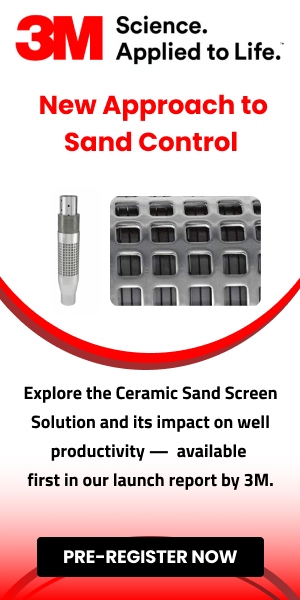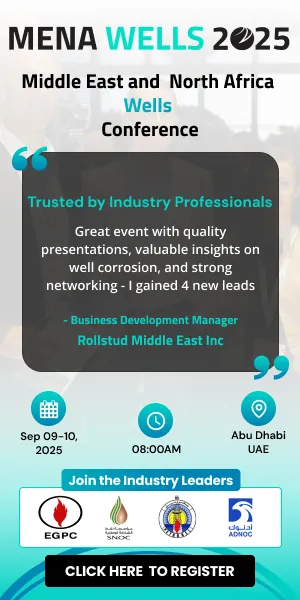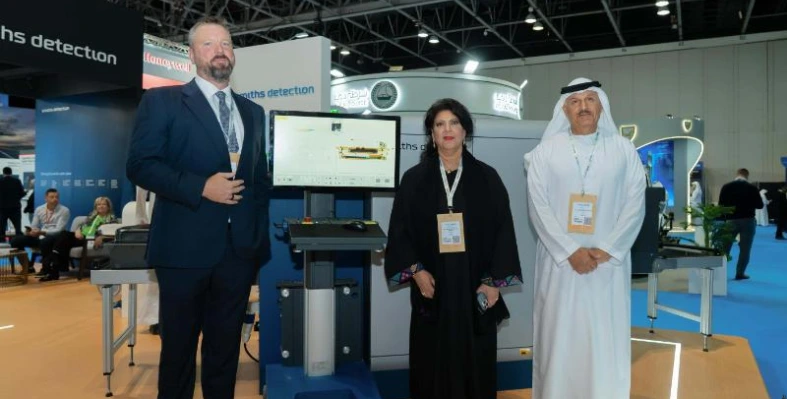In The Spotlight
Aed Energy secures investment to scale thermal storage in MENA
Aed Energy has secured investment from Catalyst, the Masdar City and bp-backed accelerator dedicated to advancing climate technologies across the Middle East and beyond.
This funding will support Aed Energy’s expansion in the region and accelerate the deployment of its long-duration thermal energy storage systems.
As part of the partnership, Aed Energy will establish a branch office in Masdar City, Abu Dhabi, reinforcing its commitment to developing decentralised energy, water, and cooling infrastructure across the GCC and wider MENA region.
The new office situates the company within a global centre for clean energy innovation and commercialisation.
Optimised operations
Catalyst, backed by Masdar City and bp, provides a strong platform for scaling practical, impact-driven technologies.
With access to strategic partners and deep regional expertise, Catalyst’s investment will help Aed Energy rapidly deploy its storage systems in markets where stable, dispatchable clean energy is crucial to meeting growing demand.
Aed Energy’s modular thermal batteries store surplus renewable electricity as high-temperature heat and deliver zero-carbon baseload energy on demand.
Suitable for applications in heat, power, and cooling, these MWh-scale systems are designed for reliable, low-maintenance operation.
Their flexibility makes them particularly effective in settings where conventional batteries underperform, including remote grids, heavy industry, and integrated energy–water–cooling systems.
Also read: Johnson Controls Arabia to supply cooling system for Saudi EV facility
Acciona's role in the future of wastewater treatment in Egypt
ACCIONA, along with local firm DHCU, obtained an €35mn (US$38.15mn) contract from Egypt’s Construction Authority for Potable Water and Wastewater (CAPW) so it can operate and maintain Phase II of Cairo's Gabal El Asfar wastewater treatment complex.
The eight-year agreement rehabilitates also upgrades two major plants within the facility so that they can each treat 500,000 m³ per day.
Gabal El Asfar is known to be the largest wastewater treatment complex located in Africa as well as the Middle East. This ranks it third globally, with a total capacity of 2.5 m³ per day.
Home to more than eight million residents, it serves the vital eastern part of Cairo.
ACCIONA’s already established footprint is further reinforced by this latest contract within Egypt’s water sector.
The company led the design, construction, and commissioning in a previous expansion phase at Gabal El Asfar in 2013, adding another 500,000 m³ to its daily capacity.
ACCIONA and DHCU were entrusted not too long ago in 2022 for Phase I's operation and improvement that handles 1.5 m³ of wastewater for each day.
Other developments
Beyond Gabal El Asfar, ACCIONA has partnered together with CAPW on additional projects, and this includes the water infrastructure operations for New Cairo.
The initiative collects water from the Nile River and then transports the water. It then purifies the water and distributes to consumers in the satellite city 30 kilometers east of the capital.
The company constructed five other major drinking water treatment plants throughout Egypt.
The Almerya, Rod el Farag, Mostorod, North Helwan I, and North Helwan II plants serve collectively over six million people because they have a combined capacity that exceeds 600,000m³ per day.
Within ACCIONA’s portfolio is the Bahr Al Baqr wastewater treatment plant. It is actually another key project that is located in northwestern Egypt.
It has 5.6 m³ capacity as one of the world’s largest, designed for high-quality water production for agricultural irrigation.
Additionally, ACCIONA operates several other wastewater facilities in Egypt as these facilities include those located in Abnoub-El Fath, Sodfa-El Ghanayem, El Ayat, and Abu Simbel.
Sustainable infrastructure and renewable solutions are led by ACCIONA globally.
They have been keeping to carbon neutrality since back in 2016.
Operations are maintained in more than 40 countries, also the company reported €19.19bn (US$21bn) in sales for 2024.
Also check out:
MENA platform aims to enhance clean water accessibility
Water diplomacy: how UAE supports island nations' water security
EGA advances next-gen smelting with EX technology
Emirates Global Aluminium (EGA) has commenced hot metal production at pilot reduction cells for its next-generation aluminium smelting technology, known as EX.
The pilot programme, taking place at EGA’s Al Taweelah site, marks a major step toward scaling up the EX technology for full industrial deployment.
It lays the groundwork for EGA’s future expansion in low-carbon primary aluminium production, while also reinforcing the company’s standing as a leading provider of smelting technology to the global aluminium sector.
In addition to testing the technology’s operational readiness, the pilot will serve as a proving ground for the most advanced Industry 4.0 applications in aluminium manufacturing.
Cutting emissions
EGA will integrate its existing digital use cases into the EX cells and is also developing cutting-edge capabilities that leverage artificial intelligence and advanced data analytics to enhance operational performance.
EGA has been developing its own aluminium smelting technologies in the UAE for over 35 years.
Since the 1990s, the company has used its proprietary technology for every smelter expansion and has successfully retrofitted all older production lines.
In 2016, EGA became the first UAE industrial company to license its core process technology internationally through a landmark agreement with Aluminium Bahrain, which used EGA’s technology for its Potline 6 expansion.
EX is the 10th generation of EGA’s in-house smelting technology, with pilot cell construction beginning in late 2024.
Designed to increase output while reducing energy consumption and emissions, EX offers improved productivity per sqm compared to the company’s DX+ Ultra platform.
Depending on the variant, EX is expected to cut greenhouse gas emissions by approximately 5% to 12% per tonne of aluminium produced.
EGA’s DX+ Ultra is already considered among the most energy-efficient smelting technologies in the global market.
The company launched its digital transformation in 2021 to improve cost-efficiency, responsiveness, safety, and sustainability.
Since then, EGA has implemented more than 80 Industry 4.0 applications, generating roughly US$100mn in value. In January 2025, EGA became the first aluminium company globally, and the first industrial firm in the UAE, to be named an Industry 4.0 Global Lighthouse by the World Economic Forum.
Abdulnasser Bin Kalban, chief executive officer of EGA, said, “First hot metal from these EX Technology reduction cells is a key milestone for both our technology leadership and future growth at EGA. Our goal is to expand our primary aluminium production with the most advanced and smart aluminium smelting technology, to build the smelter of the future and to create further value for EGA through smelting technology partnerships around the world."
Also read: EGA signs agreements to produce gallium in the UAE
Rimini, Italy
Aed Energy secures investment to scale thermal storage in MENA
Aed Energy has secured investment from Catalyst, the Masdar City and bp-backed accelerator dedicated to advancing climate technologies across the Middle East and beyond.
This funding will support Aed Energy’s expansion in the region and accelerate the deployment of its long-duration thermal energy storage systems.
As part of the partnership, Aed Energy will establish a branch office in Masdar City, Abu Dhabi, reinforcing its commitment to developing decentralised energy, water, and cooling infrastructure across the GCC and wider MENA region.
The new office situates the company within a global centre for clean energy innovation and commercialisation.
Optimised operations
Catalyst, backed by Masdar City and bp, provides a strong platform for scaling practical, impact-driven technologies.
With access to strategic partners and deep regional expertise, Catalyst’s investment will help Aed Energy rapidly deploy its storage systems in markets where stable, dispatchable clean energy is crucial to meeting growing demand.
Aed Energy’s modular thermal batteries store surplus renewable electricity as high-temperature heat and deliver zero-carbon baseload energy on demand.
Suitable for applications in heat, power, and cooling, these MWh-scale systems are designed for reliable, low-maintenance operation.
Their flexibility makes them particularly effective in settings where conventional batteries underperform, including remote grids, heavy industry, and integrated energy–water–cooling systems.
Also read: Johnson Controls Arabia to supply cooling system for Saudi EV facility
Acciona's role in the future of wastewater treatment in Egypt
ACCIONA, along with local firm DHCU, obtained an €35mn (US$38.15mn) contract from Egypt’s Construction Authority for Potable Water and Wastewater (CAPW) so it can operate and maintain Phase II of Cairo's Gabal El Asfar wastewater treatment complex.
The eight-year agreement rehabilitates also upgrades two major plants within the facility so that they can each treat 500,000 m³ per day.
Gabal El Asfar is known to be the largest wastewater treatment complex located in Africa as well as the Middle East. This ranks it third globally, with a total capacity of 2.5 m³ per day.
Home to more than eight million residents, it serves the vital eastern part of Cairo.
ACCIONA’s already established footprint is further reinforced by this latest contract within Egypt’s water sector.
The company led the design, construction, and commissioning in a previous expansion phase at Gabal El Asfar in 2013, adding another 500,000 m³ to its daily capacity.
ACCIONA and DHCU were entrusted not too long ago in 2022 for Phase I's operation and improvement that handles 1.5 m³ of wastewater for each day.
Other developments
Beyond Gabal El Asfar, ACCIONA has partnered together with CAPW on additional projects, and this includes the water infrastructure operations for New Cairo.
The initiative collects water from the Nile River and then transports the water. It then purifies the water and distributes to consumers in the satellite city 30 kilometers east of the capital.
The company constructed five other major drinking water treatment plants throughout Egypt.
The Almerya, Rod el Farag, Mostorod, North Helwan I, and North Helwan II plants serve collectively over six million people because they have a combined capacity that exceeds 600,000m³ per day.
Within ACCIONA’s portfolio is the Bahr Al Baqr wastewater treatment plant. It is actually another key project that is located in northwestern Egypt.
It has 5.6 m³ capacity as one of the world’s largest, designed for high-quality water production for agricultural irrigation.
Additionally, ACCIONA operates several other wastewater facilities in Egypt as these facilities include those located in Abnoub-El Fath, Sodfa-El Ghanayem, El Ayat, and Abu Simbel.
Sustainable infrastructure and renewable solutions are led by ACCIONA globally.
They have been keeping to carbon neutrality since back in 2016.
Operations are maintained in more than 40 countries, also the company reported €19.19bn (US$21bn) in sales for 2024.
Also check out:
MENA platform aims to enhance clean water accessibility
Water diplomacy: how UAE supports island nations' water security
A robot revolution? A look at multifunctional 3D construction using robotic arms
COBOD International, in partnership with Technische Universität Braunschweig, has launched the first commercially available multifunctional construction robot, expanding the scope of 3D printing in construction.
Unveiled during the grand opening of the Digital Construction Site at TU Braunschweig, the system merges COBOD’s BOD2 3D construction printer with a telescopic vertical extension and robotic arm designed for the Shotcrete 3D Printing Process (SC3DP).
Shotcrete, a concrete-spraying technique typically used in complex structures such as tunnels, retaining walls, and swimming pools, forms the basis of the SC3DP system.
However, the telescopic unit’s versatility allows it to host multiple tool types beyond shotcrete, including sanding equipment, paint spray guns, and insulation tools, transforming the 3D printer into a multifunctional robotic platform.
A 3D printing aid
The system offers a dynamic vertical reach of 3 metres, enabling the robotic arm to operate on printed structures situated up to 3 metres below the X-axis.
This functionality allows users to print, reinforce, and finish complex, double-curved concrete walls with precision and geometric freedom. Reinforcement can either be embedded after concrete placement or applied by spraying around prefabricated reinforcement meshes.
The launch was attended by Helga Kühnhenrich, Head of Research and Innovation in the Construction Industry at Germany’s Federal Institute for Research on Building, Urban Affairs and Spatial Development (BBSR), who highlighted the growing industry focus on automation to cut costs and reduce labour dependence.
According to COBOD, the robotic system can even be equipped with a gripper to automatically install prefabricated elements such as aerated concrete blocks or bricks, features traditionally outside the scope of standard 3D printing setups.
With this, the company aims to redefine what construction robotics can achieve, merging digital precision with functional adaptability.
Henrik Lund-Nielsen, general manager and founder of COBOD International, said, “For years we have had the vision of making multifunctional construction robots on the basis of our 3D construction printers. Seeing the first materialisation of our vision here makes me very proud. With this new technology we offer automation of many more construction processes than just printing of concrete walls. With our new COBOD robotic arm at the end of the telescopic arm there is an endless amount of construction tasks that our printing system can now automate and expedite to the benefit of our global customers.”
Professor Harald Kloft for Structural Design at ITE explained, “Our partnership with COBOD is a decisive step towards the digital construction site of the future. 3D printing enables automated, digitally controlled processes of simple as well as very complex tasks, like the fabrication of reinforced double curved walls. The ability to make complex, individualised, material efficient and low waste construction solutions makes 3D printing ideal for the construction industry, as it brings together economic, environmental and social aspects, such as the reduction of physical stress.”
Also read: Volvo CE excavators undergo rigorous testing; outperform rivals
Power Metallic gets licensed to explore Saudi mineral belt
Power Metallic Mines Inc., a prominent exploration and development company, has been granted the exploration licence for the Jabal Baudan project in Saudi Arabia’s Jabal Sayid Mineralised Belt.
Power Metallic is now one of the few foreign companies to secure mining concessions in the Kingdom, following a successful bid in a competitive licensing process.
CEO Terry Lynch, said, "We are honoured to have been awarded the Jabal Baudan exploration license, marking a pivotal step in our strategy to expand our portfolio into one of the world's most promising mineral belts. This achievement underscores our commitment to advancing mineral exploration globally and highlights our ability to secure high-value assets in competitive jurisdictions."
Strategic location in a mineral-rich region
The Jabal Baudan property, spanning over 200 sq km, is the largest of seven exploration packages offered in the Jabal Sayid belt.
Located approximately 150 km south of Jeddah along the western Red Sea coastal plain, the site is highly prospective for copper, gold, and zinc mineralisation.
The region is renowned for its volcanic massive sulphide (VMS) deposits, including the world-class Jabal Sayid Mine and the promising Umm ad Damar deposit.
Situated in rugged mountainous terrain intersected by wadi systems draining to the Red Sea, Jabal Baudan is underlain by late Proterozoic volcanic, volcaniclastic, and sedimentary rocks, intruded by younger plutonic rocks ranging from gabbro to granite.
This geological setting mirrors that of the nearby Umm Hiljan deposit, indicating strong potential for VMS-style mineralisation.
Historical exploration by BRGM, Riofinex, and USGS between 1966 and 1985 identified siliceous volcanic rocks and “ironstone,” suggesting mineralising systems conducive to VMS deposits.
Exploration strategy and support
Power Metallic plans to utilise historical aeromagnetic survey data to refine its exploration approach and pinpoint priority target areas.
The project is supported by Saudi Arabia’s Exploration Enablement Program (EEP), a US$182mn initiative designed to stimulate and de-risk mineral exploration investments.
The EEP offers up to US$2mn per exploration licence, with a cap of 15 licences per company, fostering knowledge exchange and growth.
This support will enable Power Metallic to enhance its geological understanding of Jabal Baudan and prioritise high-potential zones for advanced exploration.
"The Jabal Baudan site is located at the heart of the most prospective region of Saudi Arabia. It is easily reachable by world quality infrastructure and initial samples have confirmed strong potential for a large range of minerals" Dr Remi Piet, senior partner at Embellie Advisory.
You may be interested in:
Rokbak’s telematics revolution: cutting fuel costs and emissions at work sites
Metso warns against counterfeit parts in mining equipment
Komatsu launches hydrogen dump truck for the mining industry
Powering AI operations in the UAE
Abu Dhabi-based petrochemicals company Borouge is collaborating with Honeywell to conduct a proof of concept for AI-powered autonomous operations, which is is set to deliver the petrochemical industry’s first AI-driven control room designed for full-scale, real-time operation
The initiative aims to deploy the proof-of-concept technologies to enhance Borouge’s operations across its Ruwais facilities in the UAE. Autonomous operations will enable Borouge to optimise production, reduce energy use, and enhance safety while reducing costs at what will be the single largest petrochemical site in the world. Both companies will leverage their expertise in process technology and autonomous control capabilities to identify new opportunities to deploy Agentic AI solutions and advanced machine learning algorithms.
The project is a key component of Borouge's companywide AIDT programme, which is projected to generate US$575mn in value this year. In 2024, Borouge’s portfolio of over 200 AIDT initiatives—spanning operations, health and safety, sales, sustainability, and product innovation—generated $573mn in value
New systems
Borouge has already installed the world’s largest Real-Time Optimisation (RTO) system across three large-scale ethane crackers and 20 furnaces. The initiative analyses over 2,500 parameters per minute, enabling instant data-driven decisions, significantly enhancing productivity, optimising energy consumption and reducing emissions. The unique system minimises ethane dumping and optimises resource use, in line with Borouge's commitment to sustainable growth and operational excellence.
Borouge has invested in its state-of-the-art Innovation Centre located in Abu Dhabi and is now using advanced AI-powered tools to accelerate innovation, enabling the company to bring new grades of advanced polymers to market quicker. In collaboration with ADNOC AI Lab, Borouge has completed its first “Polymer Optimisation” programme, achieving a 97% accuracy, enabling Borouge to reduce its development timeline from months to weeks.
Hazeem Sultan Al Suwaidi, chief executive officer of Borouge, said, “Borouge's AI, Digitalisation, and Technology (AIDT) transformation programme is setting new standards in operations, innovation and business performance. By collaborating with global AI leaders such as Honeywell, we are accelerating growth, driving efficiency, and enhancing shareholder value. This project further strengthens Borouge’s competitive edge as we continue to deliver on our ambitious AIDT roadmap.”
George Bou Mitri, president of Honeywell Industrial Automation, Middle East, Turkey, Africa, Central Asia, said, “By integrating AI and automation technologies into core operations, we are helping unlock new levels of efficiency, safety, and performance. This agreement shows how advanced technologies, applied with purpose, can reshape industrial operations at scale.”
You may be also interested in reading:
EGA advances next-gen smelting with EX technology
How are manufacturers adopting GenAI?
How are UAE industries transforming through intelligent technologies?
Maersk and Saudi Post aim to boost ecommerce logistics
Maersk Saudi Arabia (Maersk) and the Saudi Post Company (SPL) have signed a strategic Memorandum of Understanding (MoU) to enhance logistics and supply chain services for ecommerce companies operating in Saudi Arabia and potentially the wider GCC region.
The agreement aims to create a unified service model that meets the growing demand for efficient, end-to-end logistics solutions across regional and global markets.
The partnership will integrate Maersk’s global shipping and logistics capabilities with Saudi Post’s strong national delivery network.
By aligning their strengths, both organisations aim to offer a seamless logistics experience tailored to international eCommerce businesses looking to establish or scale operations within the Kingdom.
Enhancing regional logistics
Saudi Post’s in-country network, developed in line with Vision 2030 objectives, will connect with Maersk’s international infrastructure to deliver greater speed, efficiency, and reliability to customers.
Under the partnership, Saudi Post will manage all domestic services, including express customs clearance and last-mile delivery, while Maersk will handle the origin-side operations, international transport, and bonded fulfilment.
The collaboration will be supported by Maersk’s newly inaugurated Integrated Logistics Park in Jeddah, positioning Saudi Arabia as a vital regional logistics hub.
The MoU outlines joint efforts in digital system integration to ensure smooth data exchange, shared marketing and commercial initiatives to target global ecommerce clients, unified customer service protocols for consistent quality, and operational improvements to optimise capacity and performance.
This strategic alliance is expected to accelerate the development of a robust ecommerce ecosystem and reinforce the Kingdom’s role as a logistics leader in the Middle East.
"We are excited to partner with Saudi Post, who operate an unparalleled distribution network in Saudi Arabia, to create an integrated logistics solution that addresses the growing demand for efficient eCommerce fulfilment in the country," said Ahmed Al Olaby, director, Maersk Saudi Arabia, after signing the MoU. "Our extensive, global ocean network, along with the newly opened Integrated Logistics Park, would combine with Saudi Post's extensive domestic network, positioning us to deliver world-class logistics services that support businesses looking to enter or expand in the Saudi market."
“The strategic collaboration between SPL and Maersk is pivotal in streamlining cross-border e-commerce flows to and from The Kingdom of Saudi Arabia and the wider GCC, enhancing connectivity, reliability, and growth opportunities across the region”, said Rouni Saad, international business sales director, SPL Group.
Both companies said that the MoU "directly contributes to Saudi Arabia's Vision 2030 objectives by enhancing the Kingdom's logistics infrastructure, supporting the growth of the eCommerce sector, and facilitating international trade."
This could attract more international businesses to set up shop in Saudi Arabia, while providing them with reliable and efficient logistics solutions.
Also read: Saudi Global Ports awarded terminal concessions on the Kingdom's eastern coast





























































